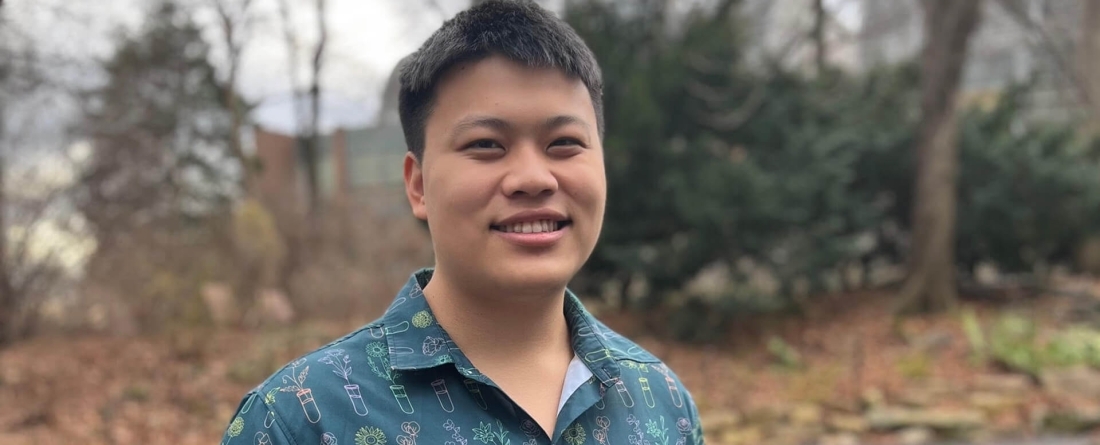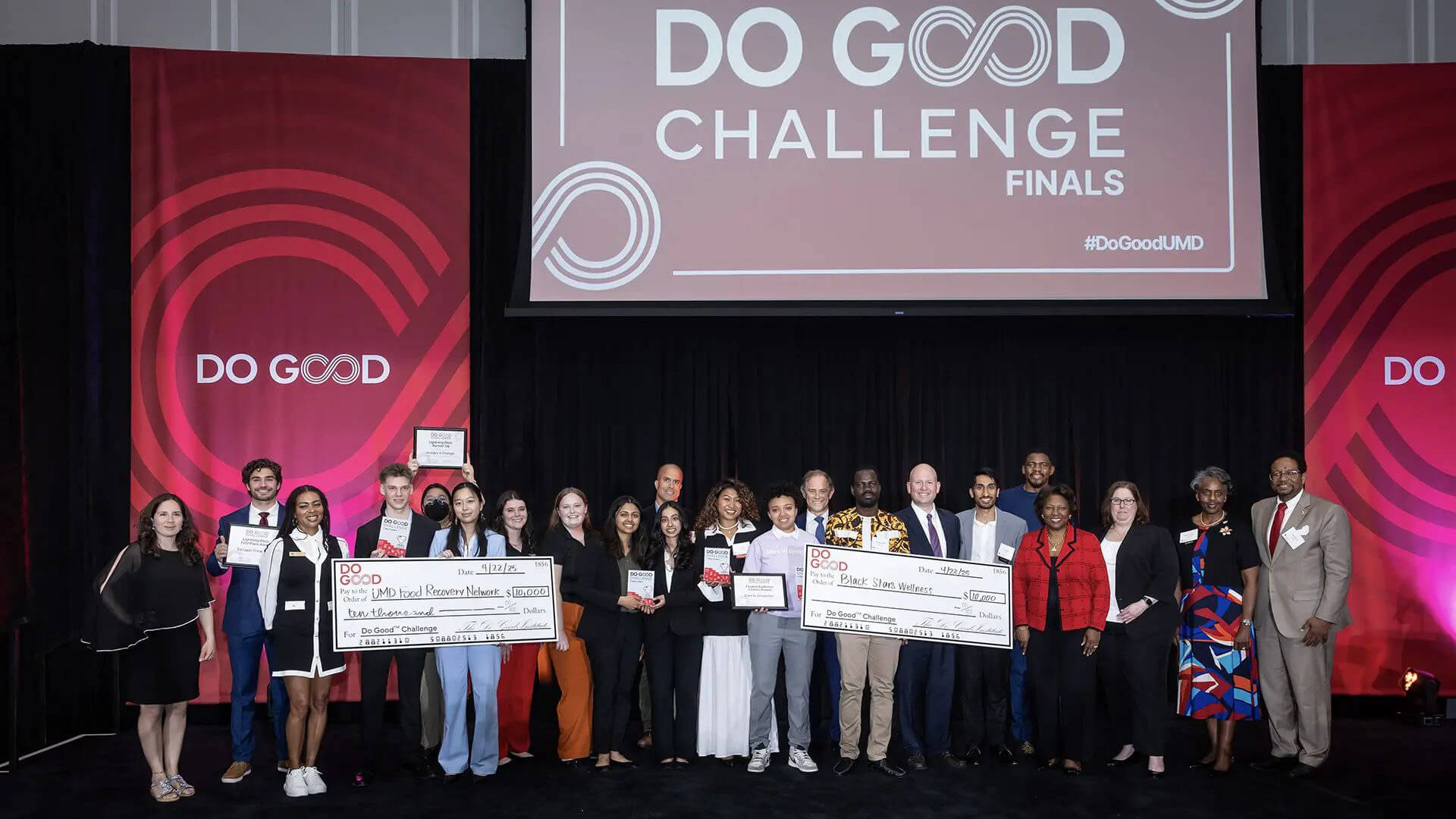
Tu is a biological sciences and economics double-degree student with a minor in nonprofit leadership and social innovation.
University of Maryland senior Kevin Tu has been awarded a 2023 Churchill Scholarship, joining only 15 other science, engineering and mathematics students nationwide winning the prestigious honor.
Tu, a biological sciences and economics double-degree student minoring in nonprofit leadership and social innovation, will receive full funding to pursue a one-year master’s degree at the University of Cambridge in the United Kingdom. The scholarship, valued at around $60,000, covers all educational fees and provides living and travel allowances and a stipend.
Tu plans to pursue a Master of Philosophy degree in oncology, with a research focus on using machine learning to develop a cost-effective clinical test that will subtype breast cancers based on genetic information and identify each tumor’s specific driver mutations. This work with Cambridge Professors Carlos Caldas and Oscar Rueda has the potential to inform patient-specific tumor monitoring and therapy selection, especially for economically disadvantaged populations.
“We are thrilled to see another Science Terp recognized as a Churchill Scholar. Kevin's extensive research and service activities embody our university's efforts to solve the grand challenges of our time,” said Amitabh Varshney, dean of the College of Computer, Mathematical, and Natural Sciences.
“Kevin’s dedication to addressing some of the most pressing issues of our times from research, scholarship and social impact angles is truly inspiring,” said Susan Rivera, dean of the College of Behavioral and Social Sciences (BSOS). “The BSOS community congratulates him on this well-deserved honor.”
A total of 119 nominations this year came from 77 participating institutions. Eight UMD students have been nominated in the past six years—and all of them have been named Churchill Scholars.
“Kevin is the very best of us: a Terp with a big heart, fire in his belly and enough brainpower to light up a city,” said Richard Bell, a UMD professor of history who serves as the university’s faculty advisor for United Kingdom fellowships. “His Churchill triumph continues the University of Maryland’s extraordinary record of accomplishment in this most selective of international scholarships.”
Tu, a member of the University Honors program and a Banneker/Key Scholar, has been conducting translational molecular biology and computational biology research for the past seven years at The Johns Hopkins University School of Medicine, the University of Maryland School of Medicine (UMSOM), the University of Iowa Carver College of Medicine, the Duke University School of Medicine and UMD. Tu has also conducted STEM education research with Daniel Levin, an associate clinical professor in UMD’s Department of Teaching and Learning, Policy and Leadership, since 2020.
His work has resulted in seven published papers—including four that list him as the first author—and seven first-author manuscripts currently under review.
He studied sex differences in Alzheimer’s disease at Hopkins (2016-19), followed by research with UMD Cell Biology and Molecular Genetics Professor Jonathan Dinman focusing on a mechanism called -1 programmed ribosomal frameshifting (2019-21).
In his research at UMSOM that began in 2021, he studied how the low-oxygen microenvironment in pancreatic cancer induced radiation resistance and tumor aggression on the molecular level. In 2022, he quantified the impact of telemedicine on sepsis patient outcomes at the University of Iowa and mined cancer mutational data to identify mutations that could be used for pharmaceutical and green chemistry applications at Duke University.
“Though I started as a bench scientist, I have moved more toward computational techniques as I prefer their wide applicability and enjoy synthesizing large data sets into a story,” Tu said. “I also pursued an economics degree to gain insight into the economics of health care and therapeutics development, so that my research can be informed by considerations of affordability, sustainability and equity.”
In addition to his many research projects, Tu founded and serves as president of CORA (Combating Overdoses in Rural Areas), a nonprofit organization that provides opioid education, resources and harm reduction to rural communities across the country. In this role, he manages eight chapters spanning three states, which have reached over 3,000 people with educational modules and trained over 1,000 individuals in overdose response. For his efforts, Tu won first place in UMD’s Do Good Challenge and received the Governor’s Service Award.
During his time at UMD, Tu also co-founded a free K-12 tutoring organization called The Every Child Project and an anonymous peer-to-peer emotional support text line for UMD students called Lean On Me. He is also UMD’s Green Labs coordinator, implementing programs to make the research labs on campus more sustainable. He recently founded a startup that aims to do the same in labs internationally.
Tu created and teaches a one-credit class (BSCI 238D) on research methodologies through UMD’s Student Initiated Courses (STICs) program. The course, which teaches the mechanisms behind common lab techniques, grew from Tu’s observation that undergraduates are proficient in following experimental protocols but often do not understand the chemical basis of the techniques, which makes it difficult for them to troubleshoot and optimize experiments. He has been teaching the course since 2020.
In addition, he serves as a crisis counselor on the 988 national suicide and Trevor Project lifelines and founded UMD’s satirical publication The Hare.
In 2022, Tu received a Barry M. Goldwater Scholarship and Amgen Scholarship. He was also named a Rhodes, Gates-Cambridge and Marshall Scholarship finalist.
After his time at the University of Cambridge, Tu plans to pursue an M.D./Ph.D. in cancer biology and focus his research on understanding the genetic drivers of cancer.
“My long-term goal is to produce socially impactful research as a professor and make personalized cancer care more accessible to populations that typically wouldn't have access to it,” Tu said.
Written by Abby Robinson



